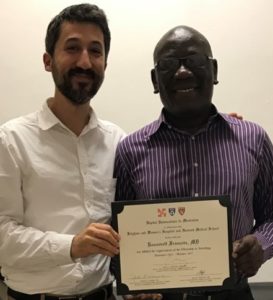Aaron Berkowitz, MD, PhD, was recently awarded the Mridha Spirit of Neurology Humanitarian Award from the American Brain Foundation and American Academy of Neurology for his work to expand access to neurology education and clinical care in resource-limited regions of the world. This award recognizes his tireless efforts developing Neurology training in Haiti. Over six years, Dr. Berkowitz has grown from a visiting professor to an architect of expanded neurology care with a vision for development of specialty training programs globally.

Knowing there was a dire shortage of neurology support in Haiti, in 2012, Dr. Aaron Berkowitz reached out to his colleague Dr. Michelle Morse. Dr. Morse of the BWH Division of Global Health Equity and a founder of EqualHealth explained that there was just one neurologist for the entire population of 10 million people in Haiti which contrasts starkly to 76 neurologists per 100,000 people in Boston. In Haiti, the vast majority of patients had no access to a neurologist for care and most general practitioners had no access to a neurologist to learn from.
In response to this grave inequity, Dr. Berkowitz began working in Haiti with Partners In Health and EqualHealth teaching Continuing Medical Education courses in neurology for internal medicine and family medicine staff and trainees.
Yet, after several years, Dr. Berkowitz started to feel spread thin- he would give lectures to large groups, and see consults with individual doctors in several departments in two different hospitals on each trip. “It seemed like we could have more impact if we focused on training a smaller group over a longer period instead of a ‘neurology for all’ approach,” says Berkowitz. A team including Dr. Berkowitz, Dr. Morse and colleagues at Hôpital Universitaire de Mirebalais (HUM), developed an intensive neurology rotation for HUM internal medicine residents. Through this program, Berkowitz spent four 1-week trips to Haiti working directly with the same five residents who were released from all other responsibilities.
“Where specialists are trained, they can educate their primary care colleagues, increasing their capacity to care for patients with diseases requiring specialty referral.”
“We saw about 150 patients over four weeks, and the residents gained a deeper understanding of neurology,” Berkowitz says. “And just as exciting as watching their clinical skills develop was seeing them turn around and teach what they learned to other residents.” Given the success of the program, HUM asked Berkowitz to collaborate on launching Haiti’s first neurology training program.
Thus a two-year fellowship was born. The program accepts one Haitian doctor each year and is staffed by about a dozen US-based neurologists each of whom spends at least one week teaching in Haiti annually. With the first graduate last year, Dr. Roosevelt François, the number of neurologists in Haiti increased by 100% growing from 1 to 2 in the entire country.
“Dr. François is a real star,” says Berkowitz. “He worked and studied so hard and has become a superb neurologist.” Dr. François and Berkowitz saw the first cases of Zika-associated Guillain-Barre in Haiti and reported them in the literature. Dr. François’ research earned him an International Scholarship to present his work at the American Academy of Neurology Annual Meeting in 2017. “One of the members of the award committee told me that Dr. François was the first Haitian national to attend the meeting (Haitian-Americans and Haitian Canadians had attended in the past). And Dr. François loved going from being one of two neurologists in his entire country to one of thousands of neurologists collaborating together at the meeting.”
HUM hired Dr. François as a faculty member and program director-in-training which fits in with Dr. Berkowitz’s aspirations. “Our hope is to have the program completely locally run over the next few years and place our graduates throughout Haiti.” If he succeeds in training ten graduates over the next ten years as is his goal, Berkowitz will have increased the neurologic capacity in Haiti by 1000%.
The work has not been without its challenges. “It’s hard not being in Haiti full time,” says Berkowitz, who is full time faculty at BWH/HMS. “I am pleased that the fellows are exposed to many different visiting faculty but it sometimes decreases the continuity of education and collaboration.” Berkowitz hopes hiring Dr. François will provide both stability and improved coordination of visiting colleagues.
Looking to the future, Dr. Berkowitz hopes that the Neurology fellowship can serve as a model for specialty training programs with visiting faculty models in resource-limited settings. “Primary care is of course a major priority,” says Berkowitz, “but neurologic diseases are incredibly common and can be disabling and stigmatized if there are no neurologists to diagnose and treat patients with diseases like stroke, epilepsy, Parkinson’s disease. Where specialists are trained, they can then educate their primary care colleagues, increasing their capacity to care for patients with diseases requiring specialty referral.”
Dr. Berkowitz serves as Director of the Global Neurology Program at BWH, Associate Professor of Neurology at Harvard Medical School, an affiliate of HMS’ Department of Global Health and Social Medicine, and Health and Policy Advisor in Neurology to PIH.
[i] http://www.dartmouthatlas.org/data/table.aspx?ind=141
